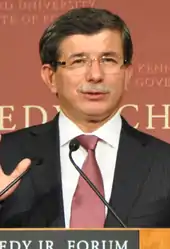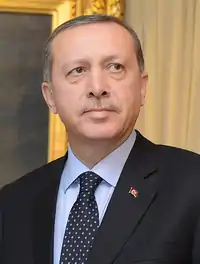2023 vision
The 2023 vision is a list of goals released by the administration of Prime Minister (now President) Recep Tayyip Erdoğan in 2010 and 2011, to coincide with the centenary of the Republic of Turkey in 2023.
| ||
|---|---|---|
Gallery: Picture, Sound, Video |
||
Elements of the 2023 vision
Economy
- Become one of the top ten world economies by 2023
- Gross domestic product of $1 trillion by 2014 (Assessment: $0.934 trillion in 2014)[1] and of $2 trillion by 2023
- Per capita income of $25,000 by 2023
- Increase annual Turkish exports to $500 billion by 2023
- Foreign trade volume of $1 trillion by 2023
- Increase the employment rate by 10 points to a working population of 30 million by 2023
- Reduce the unemployment rate to 5 percent by 2023
- Addition of income through applying duty on ocean trade through Straits of Bosphorus and Dardanelles.
Progress on economic goals
| Policy | 2009 | 2011 | 2014 | 2016 | 2018 | 2023 | 2023 Target |
|---|---|---|---|---|---|---|---|
| Top ten world economies (GDP) | 17th | 17th | 17th | 17th | 18th[2] | 10th | |
| Top ten world economies (GDP PPP) | 17th | 15th | 13th | 13th | 13th | 10th | |
| Gross domestic product (GDP) | $0.644 trillion | $0.832 trillion | $0.934 trillion | $0.863 trillion | $0.771 trillion | $2.00 trillion | |
| Gross domestic product (GDP PPP) | $1.13 trillion | $1.41 trillion | $1.78 trillion | $1.99 trillion | $2.30 trillion | $2.00 trillion | |
| Per capita income (GDP) | $8,880 | $11,140 | $12,020 | $10,820 | $9,410 | $25,000 | |
| Per capita income (GDP PPP) | $15,640 | $18,910 | $22,970 | $24,980 | $28,040 | $25,000 | |
| Annual exports | $102 billion | $135 billion | $157 billion | $142 billion | $168 billion | $500 billion | |
| Foreign trade volume | $0,24 trillion | $0,38 trillion | $0,40 trillion | $0,34 trillion | $0,39 trillion | $1,00 trillion | |
| Employment rate | 24.2 million | 26.3 million | 28.7 million | 30.2 million[3] | 32.6 million | 30 million | |
| Unemployment rate | 13.1% | 9.1% | 9.9% | 10.9% | 11.0% | 5% |
Energy

- Build 20,000 Megawatt installed capacity of wind energy and 600 Megawatt installed capacity of geothermal energy[4]
- Reduce energy consumption to 20 percent below 2010 levels through improved efficiency[5]
- Three operating nuclear power plants and those plants are expected to have an installed capacity of 14,700 Megawatt.
Foreign policy
Turkey's foreign-policy objectives and vision as articulated by former Prime Minister Ahmet Davutoğlu:
First, Turkey aims to achieve all EU membership conditions and become an influential EU member state by 2023. Second, it will continue to strive for regional integration, in the form of security and economic cooperation. Third, it will seek to play an influential role in regional conflict resolution. Fourth, it will vigorously participate in all global arenas. Fifth, it will play a determining role in international organizations and become one of the top 10 largest economies in the world. To achieve them, Turkey must make progress in all directions and in every field, take an interest in every issue related to global stability, and contribute accordingly.[6]
In 2016, President Erdogan called for a referendum after Britain's decision on leaving the European Union.
Health care
- 100 percent participation in health insurance systems
- Raise the number of physicians per 100,000 people to 210 physicians (175 currently)
Transport
- Build 11 thousand kilometers of new railway and expand the high-speed train network
- Build 15 thousand kilometers of divided highway
- Grow ports to number among world's 10 largest
- Domestically produced airplanes, unmanned aerial vehicles and satellite[7]
Tourism
- Be the fifth largest tourist destination[8]
- Host 50 million visitors
- Obtain US$50 billion of tourism revenue[9]
Progress on tourism goals
| Policy | 2009 | 2011 | 2014 | 2016 | 2018 | 2023 | 2023 Target |
|---|---|---|---|---|---|---|---|
| Fifth largest tourist destination | 6th | 6th | 6th | 10th | 6th | 5th | |
| Amount of tourist visitors | 27,3 million | 31,3 million | 36,8 million | 25,3 million | 39,4 million | 50,0 million | |
| Tourism revenue[10] | $25,1 billion | $28,1 billion | $34,3 billion | $22,1 billion | $29,5 billion | $50,0 billion |
Effects on the progress of 2023 vision
2016 Turkish coup d'état attempt
On the summer of 2016, a coup d'état was attempted in Turkey against state institutions, including the government and President Recep Tayyip Erdoğan. The attempt was carried out by a faction within the Turkish Armed Forces that organized themselves as the Peace at Home Council.[11] They attempted to seize control of several key places in Ankara, Istanbul, and elsewhere, but failed to do so after forces loyal to the state defeated them.
During the coup, over 300 people were killed and more than 2,100 were injured. Many government buildings, including the Turkish Parliament and the Presidential Palace, were bombed from the air. Mass arrests followed, with at least 40,000 detained,[12] including at least 10,000 soldiers and 2,745 judges. A significant amount of tourists cancelled their trip to Turkey.
2018 Turkish currency and debt crisis
The Turkish currency and debt crisis of 2018 was a financial crisis in Turkey. It is characterized by a plunging value of the Turkish lira, high inflation, rising borrowing costs and corresponding loan defaults.
Under the government of Recep Tayyip Erdoğan, Turkey has been running huge and growing current account deficits, reaching $7.1 billion by January 2018, while the rolling 12-month deficit rose to $51.6 billion.[13] By the end of 2017, the corporate foreign-currency debt pile in Turkey had more than doubled since 2009, to $214 billion after netting against their foreign-exchange assets, equal to about 40 percent of economic output, with about 80 percent held by domestic banks.[14]
| Year | 2005 | 2006 | 2007 | 2008 | 2009 | 2010 | 2011 | 2012 | 2013 | 2014 | 2015 | 2016 | 2017 | 2018 | 2019 | 2020 |
|---|---|---|---|---|---|---|---|---|---|---|---|---|---|---|---|---|
| USD/TRY | 1.344 | 1.428 | 1.303 | 1.302 | 1.550 | 1.503 | 1.675 | 1.796 | 1.904 | 2.189 | 2.720 | 3.020 | 3.648 | 4.828 | 5.676 | 6.86 |
In 2018, the lira's exchange rate accelerated deterioration, reaching a level of US$4.5/TRY by mid-May. Among economists, the accelerating loss of value was generally attributed to Recep Tayyip Erdoğan preventing the Central Bank of the Republic of Turkey from making the necessary interest rate adjustments.[16][17] Erdogan, who claimed interest rates beyond his control to be "the mother and father of all evil", said that "the central bank can't take this independence and set aside the signals given by the president."[16]
The "Mastermind" conspiracy theory
In 2014, Recep Tayyip Erdoğan coined the term "mastermind" (Turkish: üst akıl) to denote the alleged command and control institution, somewhat ambiguously placed with the government of the United States, in a comprehensive conspiracy to weaken or even dismember Turkey, by orchestrating every political actor and action perceived hostile by Turkey.[18][19][20] Erdoğan as well as the Daily Sabah have on multiple occasions alleged that very different non-state actors — like the Salafi jihadist Islamic State of Iraq and the Levant (ISIL), the Anarcho-Marxist Kurdistan Workers' Party (PKK) and the Islamist cult with political ambitions around Fethullah Gülen — were attacking Turkey at the same time in a well-coordinated campaign.[21] A notable instance of promoting the "Mastermind" conspiracy theory was in February 2017 Ankara Mayor Melih Gökçek claiming that earthquakes in the western province of Çanakkale could have been organized by dark external powers aiming to destroy Turkey's economy with an "artificial earthquake" near Istanbul.[22]
In the campaign for the 2018 general election in Turkey, a widespread conspiracy theory, infused with antisemitism, claimed that the Turkish lira's decline were the work of a shadowy group, made up of Americans, English, Dutch and "some Jewish families" who would want to deprive incumbent President Erdogan of support in the elections.[23]
References
- "World Economic Outlook Expectations". IMF Data Mapper. IMF. Retrieved 23 July 2019.
- Mark Bentley (2 June 2018). "Mr. Erdoğan: drop impossible growth goals to stabilise economy". Ahval.
- "The World Factbook — Central Intelligence Agency". www.cia.gov. Retrieved 2017-04-16.
- "Speech By H.E. Abdullah Gül, President Of The Republic Of Turkey, On The Occasion Of "Turkish-Swiss Cleantech Forum"". Presidency Of The Republic Of Turkey. November 26, 2010. Retrieved 2011-01-09.
- "Turkey plans to use 20 percent less energy by 2023". World Bulletin. 13 January 2011. Archived from the original on 15 January 2011. Retrieved 13 January 2011.
- Ahmet Davutoğlu (May 20, 2010). "A new vision". Foreign Policy. Archived from the original on December 5, 2014. Retrieved March 4, 2017.
- "The 2023 targets in the economy". Habertürk (in Turkish). January 23, 2011. Retrieved 2011-01-24.
- "Mr Ertuğrul Günay" (PDF). London Business Guide. May 11, 2008. Archived from the original (PDF) on October 9, 2016. Retrieved 2010-12-09.
- "Tourism Minister Gunay: 2023 Target Is To Host 50 Million Tourists". Turkish Press. May 11, 2008. Archived from the original on October 9, 2016. Retrieved 2010-12-09.
- Turkish Statistical Institute (1 December 2019). "Distribution of Foreign Arrivals and Tourism Receipts by Years" (PDF). Ministry of Culture and Tourism.
- "Turkey's failed coup attempt: All you need to know". aljazeera.com.
- "Turkey to Release Tens of Thousands of Prisoners to Make Room for Coup Suspects". The New York Times. 17 August 2016.
- "Turkish current account deficit more than doubles". Ahval. 12 March 2018.
- "Turkey's Bill for Debt-Fueled Economic Growth Starts to Fall Due". Bloomberg. 29 March 2018.
- "Exchange rates". OECD.
- "Turkey's leader is helping to crash its currency". Washington Post. 16 May 2018.
- "Investors lose their appetite for Turkey". Financial Times. 16 May 2018.
- Mustafa Akyol (31 October 2014). "The Middle East 'mastermind' who worries Erdogan". Al-Monitor. Retrieved 10 January 2017.
- Mustafa Akyol (19 March 2015). "Unraveling the AKP's 'Mastermind' conspiracy theory". Al-Monitor. Retrieved 10 January 2017.
- Mustafa Akyol (12 September 2016). "The Tin-Foil Hats Are Out in Turkey". Foreign Policy. Retrieved 10 January 2017.
- Mustafa Akyol (9 January 2017). "Why Turkish government pushes 'global conspiracy' narrative". Al-Monitor. Retrieved 10 January 2017.
- "Foreign powers performing 'earthquake tests' near Istanbul to destroy economy: Ankara mayor". Hurriyet Daily News. 7 February 2017. Retrieved 7 February 2017.
- "Tumbling Turkish lira tests voters' support for Erdogan". Financial Times. 18 May 2018.
External links
- (in Turkish) Full Text of Prime Minister Erdogan's speech
- (in English) Tourism Strategy of Turkey by Ministry of Culture and Tourism
- (in Turkish) Industry Strategy Document by Ministry of Industry and Trade

